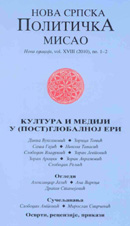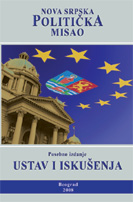| NSPM in English | |||
Russia Returns |
 |
 |
 |
| четвртак, 14. август 2008. | |
 The violence in South Ossetia is a stark reminder that high on the next presidential administration’s list of foreign-policy priorities will be a review of U.S.-Russia relations. Disputes over the U.S. missile-defense shield in central Europe, escalating tensions in the Caucasus and the state of human rights in Russia itself have done considerable harm to relations between Moscow and Washington. The violence in South Ossetia is a stark reminder that high on the next presidential administration’s list of foreign-policy priorities will be a review of U.S.-Russia relations. Disputes over the U.S. missile-defense shield in central Europe, escalating tensions in the Caucasus and the state of human rights in Russia itself have done considerable harm to relations between Moscow and Washington.Not getting as much attention as it should is the increasingly divergent approach to southeastern Europe the two countries are adopting, or how Washington’s approach to Kosovo is influencing Moscow’s approach to similar problems in the Caucasus. Fortunately, the situation in the Balkans has not escalated to the point reached in South Ossetia. Nevertheless, failing to take adequate steps to reconcile Moscow’s and Washington’s policies in the Balkans could significantly complicate political and economic reform efforts there, and create other problems for southeastern Europe’s stability as well. Over the past several years, Moscow has begun forcefully reasserting its interests in southeastern Europe. Initially this took the form of expanding Russia’s economic stake in the region, such as by buying the largest industrial enterprise in Montenegro and the largest oil refinery in Bosnia. More recently, Russia’s strategic investment efforts have resulted in an agreement with Bulgaria and Greece to build a new oil pipeline through the two countries, and achieving near dominance of southeastern Europe’s energy sector through strategic partnerships with state gas and oil companies in Bulgaria and Serbia. Moscow is now beginning to augment its economic clout in the region with an increasingly vocal political stance, most visible in Russia’s outspoken opposition to Kosovo’s secession from Serbia. Former Russian president Vladimir Putin has called American and EU support for Kosovo’s independence “illegal and immoral” and many countries around the world apparently agree. Of the forty-five countries that have recognized Kosovo so far, apart from the United States and twenty members of the EU, the other states that have recognized Kosovo consist of such relatively minor international players as the Marshall Islands, San Marino and Burkina Faso. None of the BRIC countries (Brazil, Russia, India and China) have recognized Kosovo, nor has Indonesia (the largest Muslim country in the world), nor any Arab country. All told, over three-fourths of the international community has followed Moscow’s lead in not recognizing Kosovo. Given these results, it is perhaps understandable why current Russian president Dmitri Medvedev would recently gloat that “Kosovo for the European Union is almost what Iraq is for the United States.” Moreover, the range of issues on which Washington and Moscow are at odds in the Balkans is increasing. In recent months, Moscow has called for shutting down the International Criminal Tribunal for the Former Yugoslavia and closing down the Office of the High Representative in Bosnia & Herzegovina as well. Moscow has also voiced its support for the creation of autonomous Serb territories within Kosovo, and Russian foreign minister Sergei Lavrov recently said that Moscow will support Serbia’s efforts to have Kosovo’s declaration of independence declared illegal by the International Court of Justice. The danger these developments pose for southeastern Europe is that such increasingly divergent policy positions are breaking down the great-power consensus that has promoted Balkan stability for the past decade. Bosnia’s Dayton Peace Accords and UN Security Council Resolution 1244 ending the Kosovo war were possible because all of the major players at both the international and the regional level accepted them as legitimate. Kosovo’s unilateral declaration of independence has broken this consensus, and as a result problems in the region are likely to last longer, run deeper, and be more difficult to resolve than would otherwise have been the case if Washington and Moscow were cooperating more smoothly. Many in Washington are inclined to simply dismiss Russia’s concerns and interests in southeastern Europe. But the danger posed by such unwillingness to deal seriously with Moscow on Balkan problems is clear. Even during Russia’s “weak decade,” its help and involvement was crucial in resolving some of the worst crises of that period—such as easing the siege of Sarajevo in April 1994, or the secret negotiations that ended the Kosovo war in 1999, or the efforts to secure Slobodan Milosevic’s resignation in October 2000. Today, with Russia enjoying so much more economic and political clout, attempting to sideline or bypass Moscow in the Balkans simply won’t work. In fact, it will guarantee that problems in the Balkans are not resolved—and recent history amply demonstrates how allowing Balkan problems to fester is a recipe for disaster. Developments in the Caucasus provide even more proof of this. Getting U.S.-Russian relations back on track should be a top priority for the next president. And the urgency of doing this in the Balkans is increasing. |
Остали чланци у рубрици
- Playing With Fire in Ukraine
- Kosovo as a res extra commercium and the alchemy of colonization
- The Balkans XX years after NATO aggression: the case of the Republic of Srpska – past, present and future
- Из архиве - Remarks Before the Foreign Affairs Committee of the European Parliament
- Dysfunction in the Balkans - Can the Post-Yugoslav Settlement Survive?
- Serbia’s latest would-be savior is a modernizer, a strongman - or both
- Why the Ukraine Crisis Is the West’s Fault
- The Ghosts of World War I Circle over Ukraine
- Nato's action plan in Ukraine is right out of Dr Strangelove
- Why Yanukovych Said No to Europe

.jpg)



















